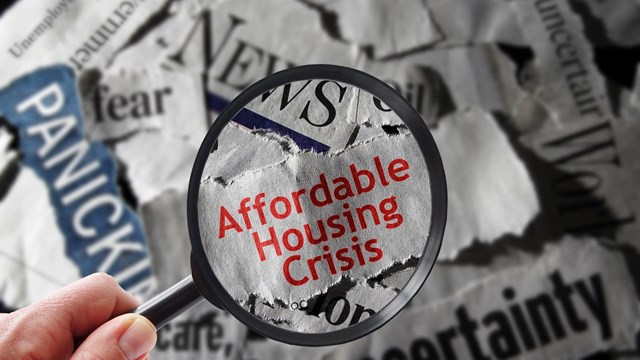While a condominium owner owns his unit, and a shareholder in a cooperative owns shares of a corporation, there are a lot of aspects of their living situations that they can't control. If the elevator doesn't work, or the grass isn't being cut, or there are leaks in the hallway that fall under the building's responsibility, the individual homeowner depends on their association board to have the situation rectified.
But what if they don't? What if the elevator's broken for three weeks, the grass is a foot high and the water in the hallway is three inches deep? What can the homeowners do to get their buildings' boards to live up to their responsibilities?
Warranty of Habitability
In a landlord-tenant rental situation, there exists what's commonly referred to as a warranty of habitability. The warranty of habitability is a legal concept that protects a tenant from a landlord's failure to properly maintain an apartment that is being rented. Essentially, it allows the tenant to withhold rent if, for example, the landlord isn't repairing leaks, or isn't responding if the heat doesn't work, or if appliances like refrigerators aren't operating properly.
"[If] you have a tenant that is not satisfied with the conditions and withholds his rent every month," says David Byrne, an attorney shareholder with the Lawrenceville, New Jersey office of Stark & Stark, "when the landlord files an eviction action, the tenant posts the money in court and says that the landlord has violated the warranty of habitability and that he shouldn't have to pay until these issues are resolved."
"The basic premise is that every residential lease carries with it an implied warranty or covenant of habitability," says Andrew McDonald, an attorney with Lomurro Davison Eastman & Munoz PA in Freehold.
"Basically, the residential landlord's warranty of habitability encompasses all facilities vital to the use of the premise for residential purposes," McDonald continues. "These things include issues regarding sufficient heat, ventilation, adequate light, plumbing, sanitation, security and maintenance, and any reasonable measure of security from foreseeable criminal activity."
Of course not every instance where a tenant is unhappy with an apartment warrants a breach of the warranty of habitability. McDonald says courts determine whether or not the landlord is in breach.
"Basically it's a reasonable-ness standard that the courts have applied," McDonald says. "If the reasonable person would find the condition to cause the premises to be uninhabitable, that would be a breach. But if not—if you can still live on the premises and notify the landlord and have him rectify the situation—then it's not a breach of the implied warranty of habitability."
Protection in HOAs
Condo owners and co-op shareholders don't have the option of withholding payment because of structural problems—can you imagine what the bank would say if you told them you're not paying your mortgage because your building is leaky?
On the other hand, standing water in your common hallway can't be ignored. The responsibilities of the association board to maintain certain aspects of a property's common areas will be spelled out in the association's bylaws and governing documents.
"A co-op and a condo both have the obligation to keep the building safe and clean and free from leaks," says Byrne. "That's the case whether or not there's a warranty of habitability."
"It's their fiduciary duty to upkeep these areas," McDonald adds. "If the unit owner or association member were of the opinion that [the board was not] taking care of their fiduciary duties—i.e. letting the premises go into disrepair, arguably that would be a breach of their fiduciary duty, it would be acting in bad faith."
In addition to their mortgage, condo and co-op owners pay money to their buildings in the form of maintenance fees. According to Byrne, in a condominium situation, there is no option to not pay maintenance fees if an owner is unhappy with something in the building.
"If every shareholder decided to withhold his fees, because the building [didn't handle] a water infiltration issue or a broken elevator, the cooperative wouldn't have any money to fix it anyway," Byrne says.
However, Byrne adds that there have been some court rulings that indicate a shareholder in a cooperative can withhold fees under certain situations. For example, if the elevator is broken for an extended period of time, a shareholder on the 15th floor may be able to withhold his or her fees. The courts apparently determined that because a condo owner actually owns the unit, a warranty of habitability couldn't be applied in terms of fees. In a co-op situation, where people own shares and no actual property, the courts seemed to have ruled that there's a relationship closer to a tenant-landlord relationship.
Not that Byrne agrees with the distinction when it comes to condos, co-ops and homeowners.
"In my mind, all of this should be viewed just like we view our government and our obligation to pay taxes," Byrne says. "If you wake up one day and you don't like what George Bush is doing, you still have to pay taxes. Your recourse is in protest, in writing letters to the editor, in running for Congress yourself, voting for George Bush's opponent next time… But if everyone just decided to not pay taxes, we wouldn't be able to do anything."
Instead, Byrne says, an owner's options are to raise community awareness of the complaint, to change the board members, or even run for the board himself.
"And if worse comes to worse, the owner can file a lawsuit seeking damages and other kinds of relief alleging a breach of fiduciary duty on the part of the condominium," Byrne says. "And in a cooperative, it's pretty much the same thing, except there is some [room that allows] the owner to withhold his fees if he's not satisfied with the way the cooperative is—or isn't—maintaining the building."
McDonald says that in determining if a board isn't living up to its fiduciary duty, courts apply what is called the Business Judgment Rule to the board's actions.
"The business judgment rule will only be violated if a reasonable person would find the board to be acting fraudulently, self-dealing or acting in an unconscionable fashion," McDonald says. "[It's] the same rule that's applied to boards of directors in the corporate setting with regards to the duty owned to shareholders of a corporation." He adds that when the acts of a board are reviewed, the court will decide whether the action is permissible under the governing documents, or if they're acting in a fraudulent, self-dealing or unconscionable manner.
Warranty of habitability can exist in a condo or co-op setting when a unit owner or shareholder rents out their apartment as a sublet or as an investment property.
"In those cases, the owner of the condo has created a landlord-tenant relationship," Byrne says, "so the owner of the condo is going to have to provide [what the owner is responsible for] in regards of the interior space."
So if the heating in the apartment doesn't work, the rental tenant may be able to withhold the rent. If, however, the heat doesn't work because of something the building did, then the board has a fiduciary duty to the unit owner.
Board Power
Byrne says that while horror stories of condo and co-op life often get attention, in reality boards tend to do a good job of maintaining common areas since it's in everyone's best interest.
"The people on the board live there too," Byrne says, "so I don't know what incentive the board would have to not fix leaks and not maintain common elements when ultimately their property values are at stake as well. Most of the time - 95 percent of the time—things are done correctly."
Condo and co-op boards tend to have a lot of power, and can wield influence in areas that go beyond the essentials that warranty of habitability covers. McDonald says that in a situation with a lot of people living in a relatively small area with its own bylaws, issues both big and small often come up.
There are also some schools of thought that say boards have too much influence—that rules prohibiting such things as putting political campaign signs up in one's yard violate fundamental rights. But McDonald says bylaws are needed in order to protect investments, and after all, each individual owner agreed to the bylaws and governing documents when they bought the unit.
And that's what keeps the majority of co-ops and condo associations in relatively good repair, McDonald says. "If capital improvements aren't paid for, if common areas aren't maintained [problems can arise], so they're given broad power to put people on notice, to fine them for the non-payment of common assessment and the like. At the end of the day, I think these [boards] are given a wealth of power because they have a responsibility to keep the common premises in good repair so that homeowners don't lose their investment."
Anthony Stoeckert is a freelance writer and a frequent contributor toThe New Jersey Cooperator.







9 Comments
Leave a Comment